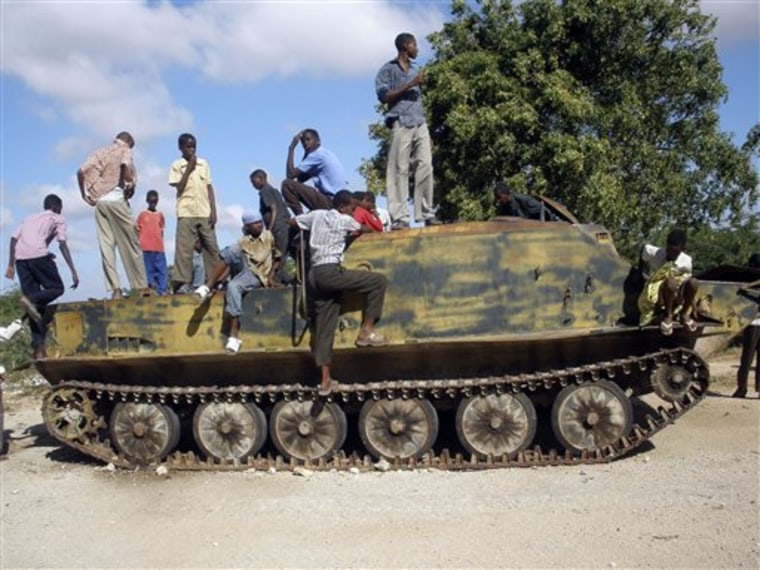The last Ethiopian troops left Somalia's capital on Thursday after a two-year deployment and Islamist militiamen took control of the bases, fueling fears they could try to expand their power in this lawless Horn of Africa nation.
Ethiopia's prime minister said he could not predict what would happen when his troops leave Somalia completely, but he expected the extremist Islamic group, al-Shabab, and others to try to seize control.
Al-Shabab, which the U.S. considers a terrorist organization with links to al-Qaida, says it wants to establish an Islamic state in Somalia.
"It would be strange if the Shabab and others did not try to capitalize on the fact that a significant proportion of the peacekeeping operation in Somalia was leaving and to try to fill in whatever vacuum they feel there is," Ethiopian Prime Minister Meles Zenawi told journalists in Addis Ababa.
"But at the moment, what will happen next is an open question," Meles said.
However, Somali Prime Minister Nur Hassan Hussein told journalists he was confident Mogadishu is safe. And by sunset Thursday, Mogadishu residents reported a day without violence. It was unclear whether this was a lull in this week's fighting or an indication of longer-term tranquility for the capital's residents.
The African Union said over the weekend that the government and its Islamic allies have about 10,000 troops, but they are poorly equipped and require logistical support.
Fears of power vacuum
The departure of the Ethiopians has raised fears of a power vacuum at a time when Somalia is also facing rampant piracy off its coast. The country has not had a functioning government since 1991 and few expect that a Somali force can establish order even with the help of a relatively moderate faction of Islamists who had agreed to share power in October.
Al-Shabab has said that it now will focus its attacks on the about 2,400 African Union peacekeepers based in Mogadishu.
Somalia's weak U.N.-backed government called in the Ethiopian troops in December 2006 to oust an umbrella Islamic group — which included the al-Shabab extremists — that had controlled southern Somalia and the capital for six months.
The Ethiopian army, one of Africa's largest, was viewed by many Somalis as abusive and heavy-handed.
Sahro Sheik Yusuf, a mother of four who fled her house in southern Mogadishu two years ago because the Ethiopians had a base nearby, said Thursday was a special day for her.
"I feel as if I'm liberated today. I'm ecstatic," said Yusuf, adding she had lived in a camp outside Mogadishu without running water and with waste all around her. "I'm happy to return to my home."
But few expect the Somali government now can ensure security. It controls only pockets of the capital, Mogadishu, and Baidoa, where the parliament sits — and has tried to rule without a president for weeks.
Thousands of civilians have been killed in fighting in the past year, particularly in the capital, and hundreds of thousands have fled the violence.
'Military interference'
Since Tuesday's handover, Islamic insurgents have continued attacking government installations. At least 24 civilians were killed and more than 50 wounded in violence Wednesday, medical staff reported.
"The Ethiopian troops have withdrawn from the capital," Hussein told journalists at the airport before leaving the country. "The city is now safe. I urge government troops and other groups to work together toward keeping peace in the city."
Hussein told journalists he will be a candidate when the parliament convenes to elect a new president.
Abdullahi Yusuf resigned from the presidency last month, saying he had lost control of the country to Islamic insurgents. Parliament's speaker has been acting president until a new one is elected before the end of January.
The United States has circulated a draft resolution calling for a U.N. peacekeeping force to be deployed in Somalia to replace the small African Union force.
But in a rare interview Thursday, hardline opposition leader Sheik Hassan Dahir Aweys said Somalia does not need more peacekeepers.
"They should stop the military interference in Somalia — especially the U.S., said Aweys, the Eritrea-based leader of a faction of the Alliance for the Re-Liberation of Somalia. A U.N. Security Council resolution has designated Aweys a terrorist, something he has denied.
Aweys, while not calling for any attacks on the AU troops, said they should leave Somalia.
